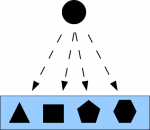Logical information theory is the quantitative version of the logic of partitions just as logical probability theory is the quantitative version of the dual Boolean logic of subsets. The resulting notion of information is about distinctions, differences, and distinguishability, and is formalized as the distinctions of a partition (a pair of points distinguished by the partition). This paper is an introduction to the quantum version of logical information theory.
Quantum Logic of Direct-sum Decompositions
The usual quantum logic, beginning with Birkhoff and Von Neumann, was the logic of closed subspaces of a Hilbert space. This paper develops the more general logic of direct-sum decompositions of a vector space. This allows the treatment of measurement of any self-adjoint operators rather than just the projection operators associated with subspaces.
From Abstraction in Math to Superposition in QM
This is a draft paper that makes a perhaps surprising connection between the old Platonic notion of a paradigm-universal like ‘the white thing’ and an indefinite superposition state in quantum mechanics.
On Classical and Quantum Logical Entropy: The analysis of measurement
This paper shows how classical and quantum logical entropy arise out of the logic of partitions, and then it shows how there is a natural connection between the nxn distinctions and indistinctions of a partition and the nxn entries in a density matrix so that the classical and quantum logical entropy can directly register what happens to the density matrix in a projective measurement. The standard notion of von Neumann entropy does nothing of the kind–so the paper is also an indirect critique of von Neumann entropy as the most natural and ‘informative’ notion of entropy to use in quantum information theory.
Quantum Mechanics over Sets
This paper published in Synthese shows how the classical finite probability theory (with equiprobable outcomes) can be reinterpreted and recast as the quantum probability calculus of a pedagogical or “toy” model of quantum mechanics over sets (QM/sets).
Counting Direct-sum Decompositions
This paper uses elementary methods to derive the formulas for and to tablulate (in the case q = 2) two related q-analogs of the Stirling numbers of the second kind and the Bell numbers for direct-sum decompositions (vector space analogs of set partitions) of a finite vector space over a finite field with q elements.
The Existence-Information Duality
The development of the logic of partitions (dual to the usual Boolean logic of subsets) and logical information theory bring out a fundamental duality between existence (e.g., elements of a subset) and information (e.g., distinctions of a partition). This leads in a more meta-physical vein to two different conceptions of reality, one of which provides the realistic interpretation of quantum mechanics.
Partition Logic talk slides Ljubljana
Slides from talk on Partition Logic at University of Ljubljana Sept. 8, 2015.
On the Objective Indefiniteness Interpretation of Quantum Mechanics
Classical physics and quantum physics suggest two different meta-physical conceptions of reality: the classical notion of a objectively definite reality “all the way down,” and the quantum conception of an objectively indefinite type of reality. Part of the problem of interpreting quantum mechanics (QM) is the problem of making sense out of an objectively indefinite reality. Our sense-making strategy is to follow the math by showing that the mathematical way to describe indefiniteness is by partitions (quotient sets or equivalence relations).
Why Delayed Choice Experiments do Not imply Retrocausality
This is the on-line first version (unpaginated) of my first publication in quantum mechanics. It shows how delayed-choice experiments should be interpreted so they do not imply retrocausality.








